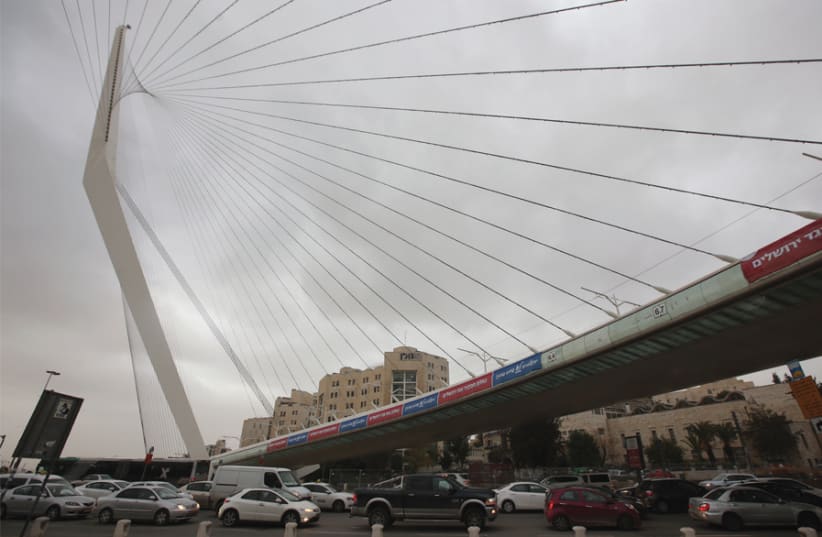Starting next week, Jerusalem will be cleaner. The city has decided to deploy Saturday-night sanitation teams for the first time. The cleaning squads will initially be assigned to Neve Yaakov, Har Homa, Rehes Shlomo and Har Nof – four primarily haredi neighborhoods.
The launch takes place as a new sanitation director takes office, who, unlike his predecessor, is a resident of the city.
The post-Shabbat cleaning initiative is part of a larger program for additional cleaning shifts. This pilot is planned to run for three months and then expand to additional neighborhoods.
In addition, as of next week and until the end of the summer, public toilets operated by the municipality will be open longer, from 7 a.m. to midnight.
In the pink
The first in this year’s series of annual spring festivals, The Jerusalem Arts Festival is set to open with a show that will portray in dance and movement the yearning to be seen, recognized and accepted. The local Dance Theater Company will perform two works – Pink and Journey of Hope – whose themes examine challenges faced by different groups and minorities. Journeys of hopeful migrants across lands and seas, memories 1980s New York nightclubs and more provide the setting to help to explore a range of feelings, fears, protests and even subversive acts through dance.
Choreographer Eyal Nahum seeks to transform the messages of these communities into art accessible to all. The Jerusalem Festival for Arts 2019 will run from April 1 to 8. artsfestival@jerusalem.muni.il; (02) 629-8143.
Landmark brilliance
Mayor Moshe Lion declared that the Calatrava (Chords or Strings) Bridge, the face of the city for visitors arriving here, will be soon be more beautiful and eye-catching. Almost 12 years after its inauguration, the bridge will undergo its first extensive maintenance, renovation and comprehensive cleaning, beginning next week. An 80-meter-high crane will be key to executing the daunting task – including installation of more than 3,000 new lamps. The NIS 450,000 project is part of a cleaning revolution – one in a series of planned projects to clean and renovate sites across the city.
Poles apart
Shabbat eruv poles (for delineating Shabbat areas) have been a cause for tension between haredi and secular residents in Kiryat Yovel, but it seems likely that this issue will finally be resolved.
Adv. Rabbi Uri Regev of Hiddush, an association that promotes freedom of religion and equality, asked the municipality this week to clarify its position on this matter. Regev suggests that all poles currently in place be removed and a clear and transparent decision be made as to who has the right to decide where posts should be placed.
Officially, this is the responsibility of the chief rabbinate in the city and this is indeed the situation throughout the country, but over the past few years, haredi residents have positioned unauthorized poles around the neighborhood. The agreement should ensure that rules are strictly enforced.
Workplace fatigue
A recent survey shows that only 12% of the Jerusalemites feel worn out in their jobs, compared to 45% of Israelis living in the center of the country, 43% of those in the South and 37% of residents of the North. The survey of 500 working men and women, Jews and Arabs, assessing work satisfaction levels, noted that workers with lower levels of education tended to feel more fatigued in their jobs.
Gallery fights eviction
The Barbur Art Gallery is hosting an event to fund its legal struggle against eviction.
Since 2005, the gallery has been a home for contemporary art and diverse cultural, social and community programming. The gallery has staged nearly 200 exhibitions, as well as music, poetry, literature, film and dance events; workshops and courses for students and the general public; lectures and seminars. The gallery also serves as a home for activities and neighborhood initiatives that relate to the art exhibitions, including a drawing class for senior citizens, workshops for neighborhood children, and a community garden. Barbur hosts an ultra-Orthodox culture group; exhibitions and meetings of SHEKEL (Inclusion for People with Disabilities) members; exhibitions of art students from Bezalel; and of Enosh, the Israeli Mental Health Association.
It also serves as a venue for events for controversial groups such as Breaking the Silence.
Barbur operates in a city-owned public structure in Nahlaot, close to the Mahaneh Yehuda market. Residents seek to locate a much-needed kindergarten there. The municipality’s shutdown request is to be adjudicated on May 1 at the District Court. Although the Barbur’s chances to avoid closure are minimal, the gallery will present its case to the best of its ability. Accordingly, a fundraiser to finance its legal battle will be held in Tel Aviv, featuring three days of art, performances and lectures.
